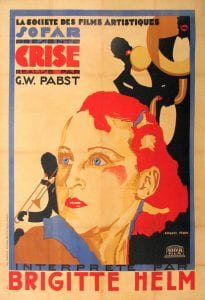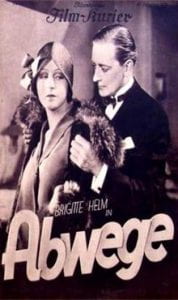
The Devious Path, 1928
One film that was shown in the 2020 Pordenone Silent Film Festival was a
German film from 1928 entitled “Abwege,” or “The Devious Path”, directed by G. W.
Pabst. This movie is about a woman in an unhealthy marriage that is trying to find joy in
a bad situation. She goes out to drink with friends, tries to run away with another man,
and even successfully divorces her husband before realizing she is still in love with him.
Although the film was probably intended to place blame on the wife, as the script
did make her look crazy; I actually believe the man was a more toxic component of their
relationship. Obviously, this is an opinion derived from my feminist, 2020 perspective,
but I did not believe the ending of this film to be a happy one. After watching this toxic
relationship unfold through unnecessary dramatic events over and over again, I did not
agree with them remarrying at the end. I was excited that the main woman, played by
Brigitte Helm, was going to get rid of the man weighing her down so she could finally
have fun and live her life, so it was a disappointment that she didn’t stick with her
decision. However, I understand the irony and comedic aspects of the ending, and I’m
sure it made more money in the 1920s because of it. We all know how much people love
a “happy ending.”
Brigitte Helm is undeniably one of the greatest actors I’ve ever seen. In a silent

Abwege
film, it is especially important to portray emotions with your face and eyes, since there is
no (or very minimal) dialogue to reveal them to you. Helm’s eyes would change so
quickly and grandly that it was very obvious what she was feeling and intending with
every motion. She would go from flirty to sad or loving to frightened just by changing the
way she looked at the person she was addressing. Her body language would reflect her
choices, with a flirty shoulder, a sad slouch, or a frightened stillness. As I was watching
the film, I could not take my eyes off of her. She completely stole the show.
Ultimately, it was very interesting to be able to visualize every intention behind
Helm’s actions without any dialogue to spell them out. Although I mentioned previously
that the goal of the film was probably to make the woman look crazy, I think she did a
great job of not allowing this to happen. Every decision she made was a direct result of
the effect someone had on her, whether it was going out with friends because her husband
said she couldn’t, or doing drugs because she felt as though she had no freedom, or
rushing back home to him because of the guilt and fear that he may have killed himself.
She even attempts to cheat with two other men, but they both betray her – one by leaving
her at the train platform, and one by sexually assaulting her. With all of this trauma and
unhappiness in her life, it is no wonder her decisions seem very “back and forth” and
indecisively crazy. Her husband, on the other hand, has less of an excuse to be trying to
control her as he does. I was rooting for every decision Helm’s character made, with the
exception of remarrying her “ex” at the conclusion of the film.

Brigette Helm, in The Devious Path
